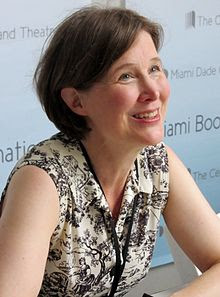 |
| Ann Patchett |
Franny’s step-father has four kids, who spend their school year in Torrance, California, but arrive in the summers to spend time with their father. While Franny and her sister would rather be in California, these four are happy to be in Virginia where the circumstances are less straightened. Thrown together without much supervision, these kids do as they please, giving their youngest brother Albie drugs and alcohol to keep him out of the way.
One day at their grandparents’ ranch, Cal, the oldest, is stung by a bee. Since he has given his Benadryls to Albie, he has no way to prevent his allergic reaction. The girls think he is pretending, but when it becomes clear that Cal is no longer breathing, Franny’s sister comes up with a story which the girls must stick to. “We weren’t there. We were in the barn with the horses.” They don’t know what has happened, but do not want to be blamed.
This tragedy ends the communal summers. Franny goes to Catholic school, spending only two weeks a year with her father in California. When Albie sets fire to his school in California (no one is hurt, but his mother can no longer cope with him), he is sent to live with his father. The only two kids left in the house, he and Franny form a bond.
Franny, at her father’s request, goes to law school, but drops out after two years. She loves to read, but does not know what to do with her life. Living with a friend named Kumar Mehta, she works as a waitress in an up-scale hotel in Chicago. One day Leo Posen, a well-known author whose books Franny adores, walks in. Franny pours him drink after drink and finally has to escort him to his room as he is too drunk to find it. Posen is giving lectures at the University of Iowa Writer’s Workshop. He sends Franny a bus ticket, asking her to come to a party. Franny goes.
Though there is a 32-year difference in their ages, Franny loves Leo Posen and lives with him. She is grateful he would choose her and he finds her indispensable, the electricity in his life. She tells him stories of her childhood, of the six step-siblings thrown together and of Cal’s death. Leo Posen writes it all down in a novel which becomes a smash hit. Franny and Leo enjoy the never-ending book tour, the adulation. Leo takes a wonderful house on Amagansett for the summer. Too many guests come, forcing Franny into an unwelcome hostess role.
During the summer, Albie turns up. He has read the book and recognized what his siblings did to him. He has made little of his life, becoming an itinerant, usually a bike messenger. Franny apologizes, sorry that she has told Leo the story. She again bonds with Albie and eventually leaves Leo.
Returning to Chicago, Franny works at a law library, but also as a bar maid at the hotel she worked at before. When Kumar comes upon her, he immediately takes her into his firm, hoping that they will again love each other. He has lost a young wife who gave him two children before she died. It is not long before Franny and Kumar marry.
As their parents age, Franny and her sister take turns coming out to be with their father when he has chemo treatments. At Christmas one goes to Virginia to celebrate with their mother’s family, the other to California to be with their father. Franny’s mother has married for a third time, but Franny doesn’t take to this family as quickly as she did to her mother’s second husband. She protects her own family of Kumar and his two sons. By this time, her sister Caroline has a law practice and children; Holly lives in Switzerland in a zendo; Jeanette is a bio-medical engineer with a West African husband and a baby in Brooklyn; and Albie too is married with a child.
The story of Cal’s death and it's telling, in a novel and then a movie, reverberates throughout the lives of all the characters. Time, the distances they all travel, and the “inestimable burden of their lives” all play a part. Though we see through the eyes of several characters, Franny’s is the narrative most clearly told. Family makes up her life and her love for each of her ever-branching family members is clearly visible.
Ann Patchett has said that “all of the books that I write are about society building … How do we assemble these characters and make a little biosphere community?” The “commonwealth” made up of the characters in this book is complex. Each retains his or her authenticity. They are knit together by failure and forgiveness, yearning and intimacy in ways that make the book feel extremely current.

No comments:
Post a Comment